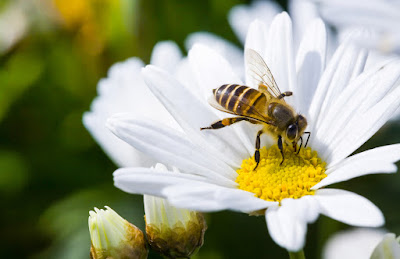Yellowjackets
Two yellowjacket species are most common throughout Missouri: the eastern yellowjacket and the southern yellowjacket. They usually build their nests in underground holes and only occasionally in aboveground cavities, meaning you're at risk of getting stung when you're trying to enjoy a day in your own back yard. Yellowjackets aggressively defend their nests and will be most aggressive in late summer and fall. Because yellowjackets forage for meats, sweets, ripe fruit and garbage, they pose a threat to humans even when they are not near their nests. It's best to leave nest removal and pest control to professionals when dealing with yellowjackets.
Baldfaced Hornet
Bald-faced hornets build paper nests at least three or more feet off of the ground, usually in trees, shrubs, on overhangs, utility poles, houses, sheds or other structures. Baldfaced hornets are beneficial because they capture other insects as prey to feed their larvae. However, bald-faced hornets are aggressive and will attack anyone or anything that invades their space, unlike other stinging insects that may only rarely sting when they feel extremely threatened. Because of their aggressive nature, it's best to leave pest control and removal to a professional.
European Hornet
The European hornet is more common in southern Missouri, but not obsolete from our region. It is dark brown with yellow and reddish markings. European hornets are much larger than yellowjackets and, unlike most stinging insects, can be active at night. It usually nests in a hollow tree or log, or within buildings. European hornets can do a great deal of damage to trees and shrubs because they strip the bark to get to the sap. Although it is a large wasp and may cause alarm due to its size, this wasp is actually not very aggressive. While they're typically not aggressive unless provoked, they do have smooth stingers, which allow them to sting over and over again.
Paper Wasps
Paper wasps find a place to hide out in the fall for winter, then make their reappearance in the springtime to begin constructing their nests. They are easily identified by their slender and variously colored bodies with brown, red and yellow. Paper wasps often build nests in residential yards, so one of the main signs of an infestation is the physical sighting of the nest itself and nearby wasps moving around the nest. Paper wasps are not as aggressive as yellowjackets or hornets in defense of their nest. While not an aggressive species by nature, paper wasps will sting if they are disturbed or their nest is threatened.
Mud Daubers
Mud daubers are solitary wasps, meaning they are not social and do not live in colonies. They build mud nests in sheltered areas. These nests are tubelike cells often positioned side by side. Mud daubers are not aggressive, don't defend their nests, and usually sting only when pinned against the skin. These insects are typically considered nuisance pests, and are actually beneficial as they help control spiders. Some species of mud dauber even feed on dangerous black widow spiders.
Cicada Killer Wasps
The cicada killer wasp is brownish-black with yellow markings on the abdomen and face. Although their size is intimidating, cicada killers are not aggressive and will sting humans only if pinned against the skin. They'll be seen mostly in the early summer months. They are dirt diggers and like to burrow near the edge of wooded areas, gardens and waste places. The only damage these wasps cause is the unsightly dirt piles dug out to create nests. The piles usually disappear with the first rain. Because cicada killers are beneficial and they help to control the cicada population, pest control efforts are typically not needed.
Err On the Side of Caution with A B Pest Control & Insulation
While not all wasps cause danger to humans, it's important to err on the side of caution, as any wasp will become territorial when they feel threatened. While some of them are scary to run into, others can be beneficial and keep other more frightening pests away. However, if you feel that pest removal and control is necessary to ensure the safety of you and your family, we highly recommend contacting a professional pest control company at the Lake of the Ozarks to handle your wasp infestation. If you've got a nest or two that you need removed, give us a call!
Lake of the Ozarks
Pest Control Company
www.abpest.net
Like us on Facebook
Follow us on Twitter
Follow us on LinkedIn
Like us on Facebook
Follow us on Twitter
Follow us on LinkedIn















